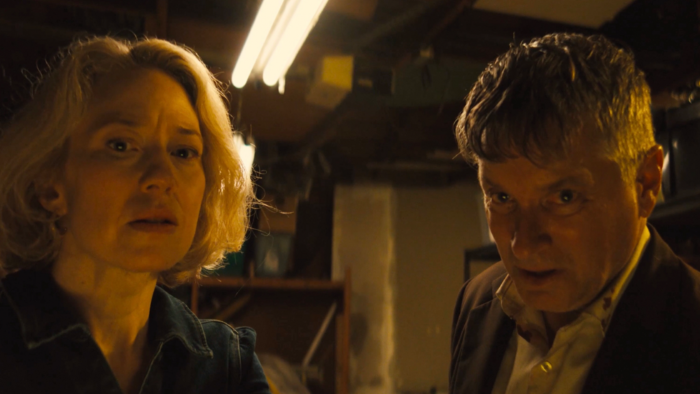Reports that “comedy is dead” have been greatly exaggerated. Or, in any case, that memo didn’t reach the 2024 Tribeca Festival, where comedy appeared to be alive and well. Among the offerings that made up the diverse lineup, three films were highlights of this year’s edition.
In the case of The French Italian, the usual mantra of “write what you know” is taken to hilarious extremes in Rachel Wolther’s directorial debut. The filmmaker also wrote the script, which is filled with millennial anxieties about bad neighbors and may be the most New York comedy of the year. Meanwhile, she has cast promising young actors to portray neuroses and anxieties so specifically that you can almost imagine they have been playing their roles for years in an imaginary sitcom
At a friend’s party, Doug (Aristotle Stuart) and Valerie (Catherine Cohen) explain why they have moved: They couldn’t stand living with the inconsiderate neighbors upstairs. The large group gathers around Doug and Valerie as if a campfire horror story is to be told, spiced up with flashbacks depicting the behavior of the couple (John Rudnitsky and Chloe Cherry) who constantly disturb Doug and Valerie’s peace of mind with endless noisy days and nights: karaoke sessions featuring “La Bamba,” heated arguments, and equally enthusiastic makeup sex. One of the listeners repeatedly insists that Doug and Valerie’s lives have been ruined forever, motivating the two to come up with one of the most pathetic and delightfully absurd revengeful ruses ever conceived: Without talent or real training as writers or directors, they set out to create a fake play in which they can cast upstairs neighbor Chloe after they discover she is an aspiring actress willing to accept any role.
Although its insular and intentionally cringe humor mostly works, The French Italian ends up getting lost in its narrative twists. Ultimately, it falls short of emphasizing the initially unflattering portrayal of its protagonists willing to do whatever it takes to teach a lesson, and loses sight of what could have been a sharper critique of the milieu they represent.
Next, Lake George confirms that genres and stories assumed to be fodder for drama can be adapted to comedy without entirely sacrificing tropes and conventions. After a prolific career writing and directing television series, director Jeffrey Reiner tries his luck with a neo-noir imbued with dark humor and enough finesse to avoid becoming a Coen brothers knock-off.
Don (Shea Whigham), a former insurance salesman, ended up in jail for making deals with the mafia. Once he’s free, he doesn’t hesitate to contact his boss, for whom he lost so many years of freedom, to collect the money he is owed. Don has never killed anyone, but he’s no snitch either, so he’s brave (and naive) enough to face people who are more willing to resort to violence and pull the trigger. Armen (Glenn Fleshler) and his wingman, Harout (Max Casella), quickly make it clear that they won’t hesitate to take him out for his impertinence. However, they eventually find an excuse to keep him alive and give Don the retribution he demands. Armen assigns him to kill his lover and accomplice, Phyllis (Carrie Coon), who has become a danger to his business by knowing too much and demanding more and more.
The premise sounds like something we’ve seen many times, where a small-time criminal ends up seduced by a ruthless femme fatale, but Phyllis is no ordinary femme fatale (more like a girl boss-femme fatale). When Don is unable to kill Phyllis, she doesn’t need to seduce him with her sexual power to commit new and varied crimes that will endanger their lives. With calculated coldness and a mastery of the situation for every occasion, she is so convincing in her rhetoric that it’s impossible to say no to her. If there is any seduction, it is more intellectual, as Don and Phyllis embark on a heist of Armen’s money, which she knows when and how to access. Of course, the execution is not as smooth as what she first thought when a trail of deaths and violent accidents leaves its mark at each stop.
This could have been a B-movie amusement were it not for the talent of its actors, especially Coon, who has been establishing herself as one of the best actresses working today, though she has yet to have a film project that finally grants her the artistic and commercial recognition her talent demands. In this case, she surprises by unleashing her comedic side like never before. When she rolls in the dirt to pose for Don in a photo shoot to make Armen believe she’s dead, it’s impossible not to chuckle at the level of physical comedy involved. At every turn, Coon’s expressions and body language perfectly embody the film’s tone, a violent gangster picture played for laughs. Lake George never bores and carries (thanks to Carrie) enough personality to make us forget how much of this we’ve seen many times before.

From left, Rosalind Chao, Michael Angarano, Michael Cera, and Kristen Stewart in Sacramento (Tribeca Festival)
When it comes to creating a universal comedy capable of working in any context and generation, a movie like Sacramento is the gold standard. Actor Michael Angarano ventures into directing for the second time while also starring in a story about high school friends who fell apart and reconnect. However, Rickey (Angarano) and Glenn (Michael Cera) couldn’t be at more different points in their lives with divergent attitudes. Unemployed Glenn struggles to assemble the crib for the baby on the way, while his wife, Rosie (Kristen Stewart), is committed to taking on the breadwinner role as soon as she can return to work. (Cera’s casting as a full-time dad is in contrast to his role in 2007’s Juno, as the teenager who knocks up the titular protagonist.) Meanwhile, Rickey has been a lost soul since his father’s death, but he now feels enlightened by his self-help group to the point where he has adopted therapeutic language as if he were a professional ready to help others. This translates to sabotaging trained experts. When he is kindly expelled from the group, Rickey decides to visit his Glenn, unaware of his friend’s life situation, except that he is still married to his longtime sweetheart.
Their reunion is a bit rough and awkward at first, particularly because Glenn doesn’t trust Rickey enough to tell him that he’s about to become a father. He also feels emotionally manipulated when Rickey confesses he must go to Sacramento to scatter his recently deceased father’s ashes. Rickey is lying: His father died a year ago. When his friend agrees to the trip, Rickey takes advantage of a moment of distraction to collect dirt from a parking lot in a tennis ball can to pass it off as the deceased’s remains. However, there is a secret intention in their trip from Los Angeles to California’s capitol, and it becomes clear that Rickey needs a good friend by his side. (Considering Lady Bird, Sacramento only needs one or two more films to become a tourist destination for cinephiles.)
Sacramento is a tender and mature comedy about what happens when coming-of-age stories come to an end. Its portrayal of male emotions and the uphill journey to express them freely finds a perfect balance of lightness and hysteria in the natural comic vein of its actors. Cera, in particular, has developed a persona in the genre as an awkward man-child. With a script co-written with Chris Smith, Angarano has created a film as sweet as it is funny, distinguished by an honest vulnerability that recalls earlier indie comedies (Little Miss Sunshine, The Kids Are All Right) that is sadly less common today.


















Leave A Comment